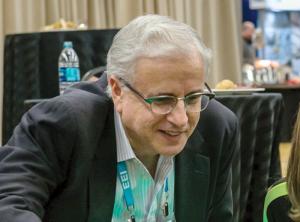‘Electrification is the Foundation, for the Population.’
Steve Mitnick is Editor-in-Chief of Public Utilities Fortnightly and author of the book “Lines Down: How We Pay, Use, Value Grid Electricity Amid the Storm.”
Why is electricity special? What are the qualities that impel us to incessantly invent machines, appliances, devices, apps that animate when electrified? That become indispensable. That become, almost, the basic necessities of life.

Man has always fashioned tools. And depended on those that most reduced the burden and multiplied the benefit of work.
We then energized tools. They performed work as would tireless men or beasts. To animate early machines and appliances, we exploited gravity's effect on rivers and streams and combustion's effect on the surrounding air and ultimately contained vessels of air and water.
Fuel combustion energy was most transformative. A riverbank is stationary. A fire can be started anywhere.
By burning fuel, we created heat which cooked food, boiled water, softened metals, warmed small areas. Burning fuel could also create force and pressure which we harnessed to replicate all manner of manual labor.
Then, electricity. Electric machines and appliances can heat, force and pressure. Generally, far better.
Electricity is now available in a hundred and fifty million buildings in the U.S. Each are equipped with tens, hundreds or thousands of places to connect. This means there are billions of spots for a machine or appliance to plug in. And billions more batteries mean the place you connect can be in your hand, handbag or pocket, within a building, or outside.
The plug, fixture, cord and switch have eight distinguishing qualities that separate electric energy from fuel combustion energy. We don't think of these eight qualities. But we really should.
For the consumer, electric energy is:
- Simple. Toddlers master its use.
- Small. Wires are strands wrapped in thin plastic.
- Safe. Accidents are rare and increasingly so.
- Silent. Indeed, sound had to be added to electric cars to alert pedestrians.
- Clean. It's emission and residue-free, and odorless.
- Cool. Efficiency minimized the heat that is dissipated.
- Controllable. Forget switches. We now use voice commands.
- Instantaneous. It turns on and off at light speed.
In contrast, fuel combustion is messy and relatively complicated, even when hidden under a vehicle front hood or down in the basement. It's because combustion energy must be manufactured right there at the consumers' point of use.
We often say that electricity is not storable. That's just not true! Batteries storing electric energy are ubiquitous. Look around you. Batteries are everywhere. In your phone. In your watch. In your laptop. In your alarm, remote, game. And on and on.
In contrast, fuel combustion energy is not storable. When the flame burns out, you're out.
Your combustion energy car charges the electric battery under the hood because electricity is a much more effective way to start the car for tomorrow morning's commute. The battery also distributes electric energy throughout the vehicle.
Then there's the beat down of electric energy over fuel combustion energy when it comes to electronics. The name gives it away, doesn't it? The first letters in the words electric and electronics are identical.
Electric energy animates electronic devices and apps. Fuel combustion energy cannot.
Electric energy powered analog electronics with vacuum tubes and then transistors. And then powered digital electronics with more sophisticated and miniaturized semiconductor circuits.
Little wonder. A switch, or a button, or our touch, or machine intelligence can turn on and off the flow of electricity instantly, repeatedly, complexly. Like the way humans speak, like the way we think.
Electric energy's intensity, direction, application can be exactly and precisely controlled. Want electric energy in a tiny spot? You got it.
Which makes you wonder. Does fuel combustion energy have any advantages?
Combustion energy is thus far more mobile than electric energy. Combustion equipment and fuel, to produce energy on a plane or truck, is still lighter in weight than a battery charged with energy that was produced earlier. This is important when weight and long-distance mobility matters.
Combustion energy is also preferable when the character of fire is wanted, such as in a fireplace, or a gourmet pizza oven. Or when the oxidation of a massive fire is needed as in certain industrial processes.
Want to hear and see more about electric energy's potential and progress in taking on combustion energy tasks? I do. That's why you'll find me at the ginormous Electrification 2018 this summer in Long Beach. I want to glimpse the future. And I want to know how I can help drive us there. Gas-free of course.


